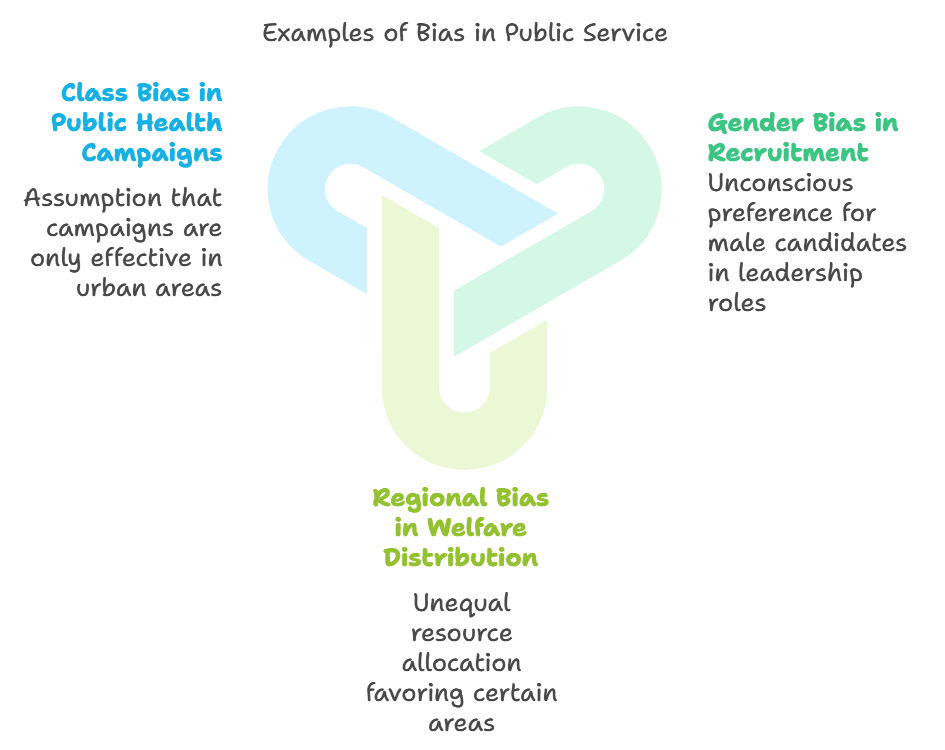- Filter By :
- Theoretical Questions
- Case Studies
-
Q. "Objectivity in public service requires acknowledging one's own biases." Do you agree? Illustrate with examples. (150 words)
14 Nov, 2024 GS Paper 4 Theoretical QuestionsApproach
- Introduce the answer by defining objectivity
- Give arguments to why Acknowledging Bias is Vital for Objectivity
- Delve into Steps to Manage and Reduce Bias in Public Service
- Conclude suitably.
Introduction
Objectivity in public service refers to decision-making based on evidence, fairness, and impartiality, devoid of personal prejudices or biases. Acknowledging one's biases is the first step towards overcoming them and ensuring equitable governance. Bias, if left unchecked, can distort judgment, leading to unfair outcomes.
Body
Acknowledging Bias-Vital for Objectivity:
- Unconscious Bias Influences Decisions: Personal biases, often unconscious, can affect how public servants interpret data, assess issues, or interact with diverse communities.
- Awareness of these biases is essential to make decisions that are truly fair and balanced.
- Transparency and Trust: By acknowledging biases, public servants enhance transparency, fostering trust among the public and colleagues. This openness demonstrates a commitment to ethical standards and accountability.
- Recognizing biases towards metropolitan areas led to initiatives like the Aspirational Districts Programme, uplifting backward regions like Dantewada in Chhattisgarh.
- Improved Policy Formulation: Recognizing personal biases leads to more inclusive policy-making, as officials are likely to consider multiple perspectives and the needs of various stakeholders.
- Ensures Gender Sensitivity: Acknowledging patriarchal biases prompted schemes like Beti Bachao Beti Padhao, improving female child survival and education in Haryana.
- Promotes Social Justice: Courts addressing caste bias, such as the Supreme Court mandated adding a provision to the Model Prisons and Correctional Services Act, 2023, to prohibit all forms of caste discrimination in prisons, illustrate objectivity in justice delivery
Steps to Manage and Reduce Bias in Public Service:
- Implicit Bias Training and Sensitization Workshops: Regular workshops on implicit biases can educate public servants about common biases (e.g., gender, caste, socioeconomic). Such training helps create awareness, encourages empathy, and provides strategies to counteract these biases.
- Standardised, Evidence-Based Decision-Making: Establishing uniform, data-driven procedures and criteria for decisions, such as recruitment or policy assessment, can minimise subjective judgment.
- Encouraging Diverse Perspectives: Forming teams with people from varied backgrounds (gender, region, caste, socioeconomic status) helps balance individual biases.
- Diverse viewpoints make for well-rounded discussions and bring attention to potential blind spots in decision-making.
- Anonymous Review Mechanisms: In situations like recruitment or resource allocation, anonymizing information (e.g., removing names, regions, and demographics) can prevent biases related to identity or background, ensuring that decisions are based on merit or need alone.
- Setting Up Accountability Mechanisms: Regular audits and oversight bodies that review decisions can help detect patterns of bias. Feedback from these audits can guide improvements and promote accountability among public servants.
Conclusion
Acknowledging biases is not a weakness but a strength in public service, as it lays the foundation for fairness, inclusivity, and trust. Objectivity can only be achieved when public servants consciously recognize and address their predispositions, ensuring decisions align with constitutional values and societal welfare.
To get PDF version, Please click on "Print PDF" button.
Print PDF





